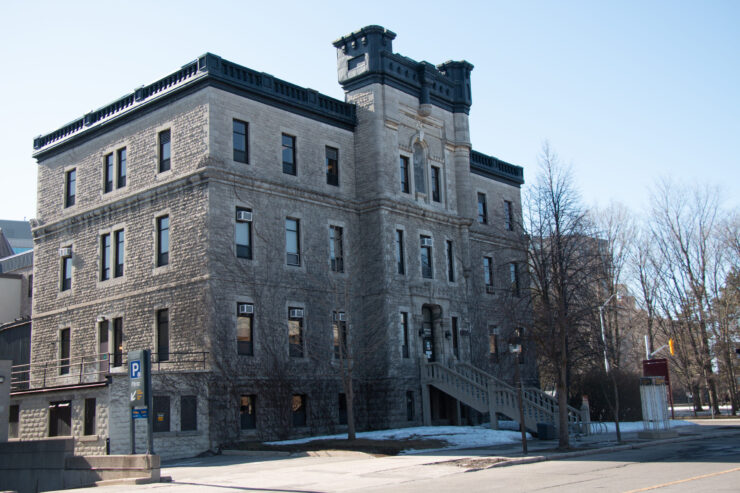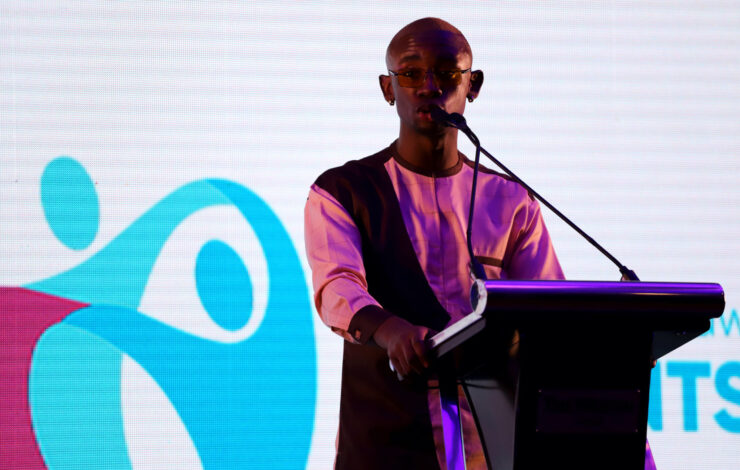Executives answered questions related to mental health services, resources on campus
The University of Ottawa Students’ Union (UOSU) hosted a town hall engagement panel on Feb. 27 at the University Centre’s Agora, where the executive committee provided updates on the initiatives they’ve undertaken and answered questions from students related to topics such as mental health and services on campus.
In her update, equity commissioner Judy El-Mohtadi said that her involvement in the campus-wide campaign on anti-racism has been one of her main areas of focus during her time on the committee.
“Initially, we started off with that open letter and that got a bit of traction,” said El-Mohtadi. “From there, we had some of our demands met from the university.”
In October, the UOSU and several other organizations on campus — including the Black Student Leaders Association — signed an open letter to president Jacques Frémont saying the administration “fails to address systemic racism in a meaningful way” and listing eight demands for action.
A month later, El-Mohtadi and student life commissioner Jason Seguya were among the student representatives added to Frémont’s anti-discrimination committee. The group hosted their first anti-Black racism town hall later that month and a second in November.
“We’ve been meeting with the committee once a month. On one end, it’s been productive because it’s the first time that we had the opportunity to do something like this, and we have the chance to get them to hear it,” said El-Mohtadi.
However, she added that both she and Seguya feel unheard by the committee and that the two would be raising these concerns during a public meeting with the committee that took place on Tuesday.
“We want to let them know that we want to progress forward a lot faster than how they’re moving the pace on that,” she said.
El-Mohtadi said that this year was the first time that the U of O celebrated Black History Month, which she said was one of her and Seguya’s short-term goals while working with the committee.
“Another thing was that (the committee) committed to offering anti-oppression training for all of their staff,” she said. “Although it’s online training, we’re kind of working on making sure that this is something that’s recurring, and it’s going to be much more in-depth down the line.”
El-Mohtadi said that she’s also partnered with the Women’s Resource Centre and the Pride Centre to launch a pilot project that would implement menstrual product dispensers in some washrooms on campus.
“These products would be free, which is amazing,” she said. “It’s a huge step, something that obviously didn’t exist before. And now it’s working towards removing barriers for students on campus.”
Operations commissioner Rony Fotsing gave his report in French, where he said that the union will be meeting with representatives from CUPE 4943 in the spring to discuss a new agreement and a collective bargaining arrangement.
“As an executive, we worked in consultation with CUPE representatives and recalled a few permanent employees and part-time employees. We never inherited any senior management staff,” he said.
Fotsing added that the union hopes to re-open the Pivik convenience store, as well as Cafe Alt, sometime in the fall. However, he said that “it is going to involve a lot of heavy lifting,” but it’s one of their main priorities that they will be working on during the spring and summer.
“With all systems in place and with almost a year of experience under our belt, we are confident that we have instituted a competent team of staff, controls and infrastructure that we believe is going to serve the needs of students for the foreseeable future,” he said.
Seguya said in his update that his role as student life commissioner was like a game of playing catch up on several different instances.
“Along with the complexities of the specific mandate — whether it’s from events or from a club system that was evolving from the ground-up — or other aspects of this mandate itself, it is truly much a game of playing catch up,” he said.
Seguya then reflected on the union’s first 101 Week that he helped organize in the fall, an event that he described as something that seemed impossible at the time.
“The results of all that hard work, all of those sweat, all those tears — when something should be treated worthwhile — it’s an experience that I’ll never forget,” he said.
He also touched upon the union’s pre-Panda Game party, which was hosted at the parking lot of the Sandy Hill Arena, an event that he said was created as a response to the City of Ottawa’s growing concerns to the annual Russell Avenue block party.
“The idea behind the pre-Panda Game event was to create a space where a lot of those elements from the Russell Avenue event can take place, but still in a way that’s safe and controlled,” he said.
Seguya also made note of how the union has created an appeal process for when clubs are being created and accepted, specifically commenting on the union’s decision to revoke club status of an anti-abortion group on campus.
“There was something very, very specific that I wanted to do differently from what was done in the past when it came to removing clubs,” he said. “That was ensuring that decisions like those wouldn’t be limited to myself as student life commissioner or in the committee that I work in, but there be multiple different avenues that we can check and that conversation can take place.”
The union’s student life committee met in December, where representatives from University of Ottawa Students for Life (UOSFL) and pro-choice supporters who launched a petition to strip the club of its status were invited to attend and voice their arguments. The committee then announced in January that they had voted to remove UOSFL’s club status.
UOSFL looked to appeal the committee’s decision at a February Board of Directors (BOD) meeting, but the appeal failed to get at least a four-fifths majority vote in favour from board members, which is required for an appeal pass.
“In the event that there is an appeal concerning a specific club, that that conversation take place first within the student life committee,” said Seguya. “After a decision is made — if seen that there is bias and improper practices with it — that decision could be reconsidered at the level of the BOD, where it’s voted on.”
Advocacy commissioner Sam Schroeder said in his report that developing a strong relationship with the university’s administration was one of his major goals for the term.
“One where we can both sit down at the table and hash out solutions to the various problems that folks are facing,” said Schroeder.
He added that he’s been working with them to improve health services on campus, noting how he’s been consulting with representatives from the Student Academic Success Service (SASS) and U of O Health Services.
“All the different players in that to see where we can help or collaborate in that right,” he said.
One of the major projects he’s worked on this year, he said, were changes to the executive structure.
“Adding a president, a student services commissioner — changing up the structure a little bit with the support of the board and other executives,” he said.
He also admitted that he hasn’t focussed much on the advocacy component of his job, with most of his work being “internally focussed.”
“But now that I’ve been working on that, Judy and I will be going to the Ontario Undergraduate Student Alliance general assembly in a couple of weeks from now,” he said. “They are a student organization that focuses much more on sitting at a table with different stakeholders — such as the province — then focusing on finding solutions that are going to work.”
Question period
A student asked the executive committee about the kind of resources that are offered to students when they seek out help from a counsellor.
“The U of O’s counselling — and the mental health system in general — is one of the things that is the most convoluted process, and I think the university recognizes that and they’re trying to deal with that,” said Schroeder.
Schroeder said that the counselling offered through SASS is the best resource for counselling services on campus. He also pointed to the Peer Help Centre, a service that’s offered through the union.
“There are a lot of good resources out there, and I think the student union and the university are trying to find ways to make them easier to find, easier to access, easier to know which one to go to, because there are so many,” he said.
Another student followed up and said that the process of receiving counselling on campus is tedious and lengthy, and then asked if the executive committee would look to make the process less strenuous.
“Sometimes it can be a very strenuous process, and that’s why we need to make sure that we’re working together (with the administration) to make it as streamlined as possible,” said Schroeder. “The university sees that and they’re willing to partner with that, and so are we.”
Schroeder said the current structure of the academic system does not accommodate students and their mental health issues or concerns.
“It’s not at all conducive to mental health. Whether it’s academic accommodations, the workload, professors understanding the issues … the structure is just not there,” he said.
Schroeder added that in his mental health report, which is scheduled to be released on March 15, he will address this issue with various proposed solutions.
One student said SASS’s utilization of the Stepped Care Model — which is a system that provides students with different counselling resources depending on their needs — has “failed” them, and asked if the union is able to revamp the administration’s approach to this system.
“It’s not a perfect system and certain areas can be improved. I can’t agree more,” said Schroeder. “The idea of the Stepped Care Model is to make sure things are more efficient, and it shouldn’t be at the cost of people not getting the services that they need.”
He added that the challenge lies in finding ways to improve the services or resources that are lacking in the school’s Stepped Care Model.
“Which is why we as a student union, we need to be pushing profits — and make sure that there are more psychiatrists — at the provincial level,” he said. “Right now, there’s a shortage there, and that’s why wait times are so long.”
Another student then asked what the union’s process looks like when reaching out to the provincial government.
“We haven’t done it yet. Certainly not enough,” said Schroeder. “That’s on me, because it’s certainly part of my mandate … and I certainly have to pick up the slack on that.”
Read More:
- Black UOSU executives raise racial discrimination concerns at BOD meeting
- UOSU developing strategic plan to improve campus mental health services
- Pivik, Café Alt set to reopen in September, but future of 1848 uncertain






